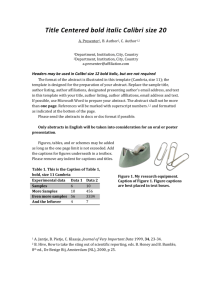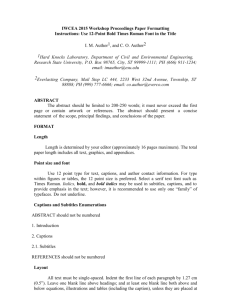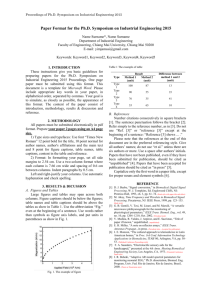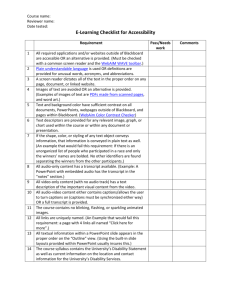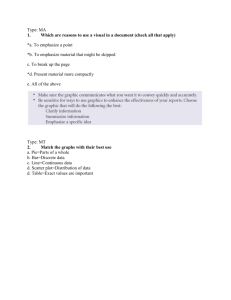Introduction
advertisement
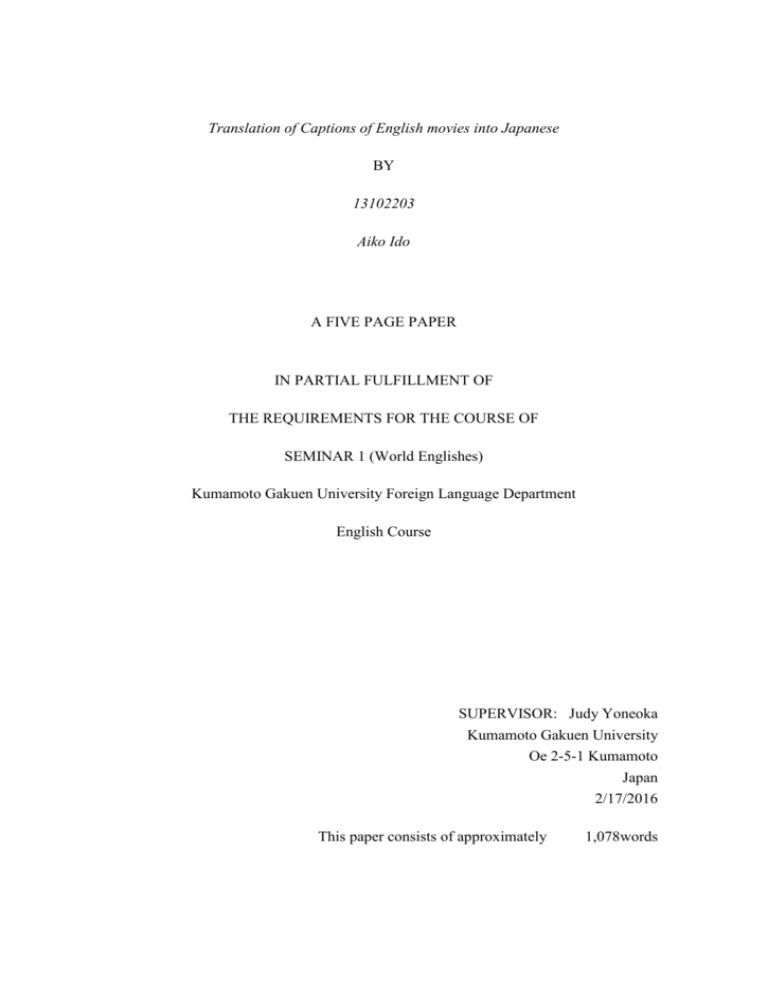
Translation of Captions of English movies into Japanese BY 13102203 Aiko Ido A FIVE PAGE PAPER IN PARTIAL FULFILLMENT OF THE REQUIREMENTS FOR THE COURSE OF SEMINAR 1 (World Englishes) Kumamoto Gakuen University Foreign Language Department English Course SUPERVISOR: Judy Yoneoka Kumamoto Gakuen University Oe 2-5-1 Kumamoto Japan 2/17/2016 This paper consists of approximately 1,078words Abstract This paper is about translating of captions of English movies into Japanese. It is made of five sections. Section Ⅱ, Ⅲ, Ⅳ will introduce three points about captions. I. II. III. Introduction Rules for caption translating Difficult points of translating captions IV. V. How to study English with captions Conclusion Translating captions is very hard because it must be translated according to some rules for translation. But Japanese viewers can enjoy watching movies and also study English by captions. I. Introduction There are captions in foreign movies to help Japanese people to understand. Those who make these captions are called caption translators. Natsuko Toda is the most famous in Japan. She translates in captions and is also an interpreter for Hollywood stars. Translating captions is very difficult. Firstly, English abilities are indispensable to the translators. Also, expression ability to understand is important, too. Of course, there are some rules for translation. The translators must translate on the basis of these rules. This paper will begin by discussing some of the rules for translating 2 captions on Section Ⅱ . Section Ⅲ will introduce difficult points of translating captions. On the other hand, it is a remarkable point that captions are useful to study English. There are various native English in movies. Viewers can study English by listening and seeing them. Section Ⅳ will introduce how to study English with captions. II. Rules for Caption Translating When creating captions, the translators must translate on the basis of the set rules. It takes longer to read words than to hear and understand them. Captions are words translated from the actors’ speech. However, if the lines are translated as- is, it could be too long to read. The translators must make short captions that can be read in a few seconds, so for example, two seconds of speech are described by eight words. The following is an example from a famous movie: 1“Come with me if you wanna live.” (The Terminator, 1984) The caption is 「助けてあげる。」. The literal translation is 「生き延びたいな Nishimori, Marie. (1994) Nishimori Marie no Bairingaru Eigagekijyo Japanese), The Japan Times, Ltd. 1 3 (in らオレについてこい。」. Though the literal translation is sixteen words, the caption is only six words. The translators must paraphrase in order for the viewers to understand easily. They must also translate captions on the basis of the connection between stories and characters. The enjoyment of movies depends heavily on how the translators translate the captions. III. Difficult points of translating captions There are two difficult points of translating captions. Firstly, Chinese characters. The translators can use Chinese characters to make short captions, but the number of Chinese characters must be reduced for people who are not used to reading movie captions. Translation can be made without Chinese characters; however, it would be too long. So, the translators must take this into account. Secondly, comedy movies. These are the most difficult to translate. If people of different nationalities watch the same movie, the timing of the laugh is different. The so-called “American joke” is sometimes not funny for Japanese people. Most of them have felt so. Japanese people can’t understand the native meaning of the joke, so it must be paraphrased for 4 them. Natsuko Toda says 2“If translators translate American joke literally, it’s not interesting for Japanese people because the background of their culture is different. So, we must translate and sometimes paraphrase lines with accuracy abiding by the real intention of lines and limiting the number of words". The “Austin Powers” series is a good example. There are many “American” jokes in these movies. It is because the culture and the custom between Japan and America is different, and because of the limit of translation in captions. IV. How to study English with captions The website http://www.eigos.com/cinema/menu.html has a lot of reasons why it is good to study English with captions. They are as follows; Movies are English teaching materials. Movies are the best materials to communicate natural English because we can experience various types of English, Standard English, 2 Interpretation Translation, http://www.kjps.net/user/rumitakizawa/interpretation_translation.html, 2004/11/25 5 accents and slang etc. Easy to learn English expressions English expressions in movies are easy for us to learn because they connect each scene. When we hear English expressions, we visualize the scenes. The improvement of English conversation abilities The words of daily conversation and colloquial expression in movies are easier to learn than those used in textbooks and other study aids. This is connected with the improvement of English conversation abilities. Listening abilities are reinforced. English in movies is spoken for native speakers at natural speed. At first, it is difficult for non-native listeners, but they gradually become used to it and are able to understand the spoken English. The improvement of pronunciation and intonation We can practice pronunciation and intonation by listening to English in movies. Moreover, English abilities are improved by seeing captions together. Studying is enjoyable. 6 People whom like watching movies can study English and enjoy it. Also, culture is reflected in each line of a movie. So, we can learn cross-cultural understanding. Now, slang, colloquial expressions and puns in captions. Slang 3Indeed, worked for me. Big time! (My Best Friend’s Wedding, 1997) “Big time!” is emphasized in the former sentence. Colloquial expressions 4“Here is looking at you.” 「君の瞳に乾杯」(Casablanca, 1942) This sentence is from colloquial expression “Here is health to you!” and “Here is luck to you!” Puns 5JOE: I’m Joe…knock, knock. ROSE: Who’s there? 3 Slangs from Movies, Songs and Paperbacks, http://usanavi.hp.infoseek.co.jp/reviewindex.html, 2004/11/25 4 Burattooyaji no Tsukommi Eigahyou, http://blog.melma.com/00108615/20040816095124, 2004/11/26 5 Knock, knock. Who’s there?, http://www2u.biglobe.ne.jp/~torisan/mglist-k.html, 2004/11/26 7 JOE: Orange. ROSE: Orange who? JOE: Aren’t you going to give us a break by zipping this credit card through the credit card machine? (You’ve Got Mail, 1998) This is a “knock knock joke” and it is known for puns in English. Japanese people who hear this for the first time don’t understand, because “knock knock” jokes are not known in Japanese culture. The caption is completely different from the line. This pun is said that the pronunciation of “Orange who” is similar to “Aren’t you” and it is fixed form. V. Conclusion As expected, translating captions is very difficult. The caption translators must translate, conforming some rules and the thinking of the intended viewers. By the grace of the translators, viewers can enjoy watching movies with captions. It is also possible to improve English abilities by continue studying English in how to study English with captions. Bibliography 8 Burattooyaji no Tsukommi Eigahyou, http://blog.melma.com/00108615/20040816095124, 2004/11/26 Eiga de Manabu Eigo, http://www.eigos.com/cinema/menu.html, 2004/11/25 Honyakuka ni Naritai, http://www.e-geos.net/newcourse/translator.html, 2004/10/04 Interpretation Translation, http://www.kjps.net/user/rumitakizawa/interpretation_translation.html, 2004/11/25 Jimaku no Mamechisiki, http://fresheye.oem.melma.com/mag/61/m00012561/a00000040.html, 2004/10/04 Knock, knock. Who’s there?, http://www2u.biglobe.ne.jp/~torisan/mglist-k.html, 2004/11/26 Nishimori, Marie. (1994) Nishimori Marie no Bairingaru Eigagekijyo Japanese), The Japan Times, Ltd. (in Shimizu, Shunji and Toda, Natsuko. (1999) Eigajimaku ha Honyaku dehanai (in Japanese), Hayakawashobo. Slangs from Movies, Songs and Paperbacks, http://usanavi.hp.infoseek.co.jp/reviewindex.html, 2004/11/25 9

